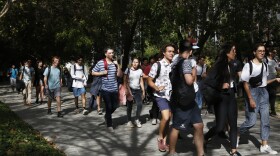Maria Paz Gutierrez
-
Over 30 million people in the U.S. have hearing loss. Neuroscientist Jim Hudspeth explains how the ear's thousands of hair cells function to amplify sound—and how they can be damaged but not repaired.
-
Flint, Michigan is the site of one of the worst ongoing water crises in recent U.S. history. Artist LaToya Ruby Frazier has spent years capturing the stories of life living with toxic water.
-
Architect Michael Murphy believes that buildings can offer far more than shelter. Considering factors both material and human, he explains how thoughtful design can make us healthier and happier.
-
Former gymnastics coach Valorie Kondos Field led her team to victory by creating a supportive environment, instead of a cutthroat one. The impact of that decision, she says, echoes far beyond the gym.
-
In 2016, Chile passed gratuidad, or "free college." As the idea gains popularity ahead of the 2020 presidential election in the U.S., Chile offers some lessons from what has happened there.
-
The Petronio Alvarez festival is the big event of the summer — five days of music and food and fashion. More than 100,000 people travel to celebrate Afro-Colombian culture.
-
In 1968, Congress passed the Fair Housing Act, which made it illegal to discriminate in housing. Gene Demby of NPR's Code Switch explains why neighborhoods are still so segregated today.
-
The NCAA men's basketball tournament will bring in about $770 million in revenue this year. A writer argues that paying black student-athletes might have unforeseen consequences.
-
As Oakland's legal cannabis industry grows, the biggest players seem to have two things in common: They're white, and they have lots of money.
-
The unrest in the Motor City a half-century ago this summer left 43 dead. It was one of the most devastating episodes of civil conflict in the 20th century. But was it a riot or a rebellion?







